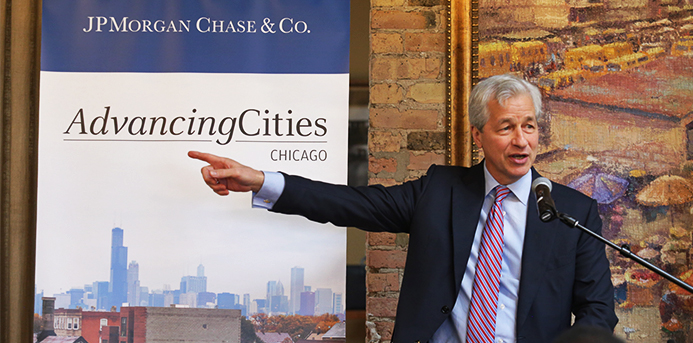In an effort to better serve struggling urban areas, JPMorgan Chase (JPMC) aligned its corporate responsibility efforts with its foundation giving to launch AdvancingCities. The initiative leverages the bank’s many resources — people, data, connections, and strategic insights from the JPMorgan Chase Institute — to form collaborations with influential civic organizations to help transform blighted communities. The bank has committed a $500 million, five-year investment to revive cities worldwide.
The model targets four key areas: small business expansion, neighborhood revitalization, job and skills training, and financial health.
Through the JPMorgan Chase Service Corps, select employees from around the world share their time and talents to help nonprofit partners create greater impact in the local community. The firm views this as an elite skills-based volunteer program and their unique version of the Peace Corps.
Nonprofits that offer creative, collaborative, and sustainable solutions for economic growth can earn grants of up to $3 million through a request for proposal (RFP). Winners from the recent AdvancingCities Challenge will be announced this spring.
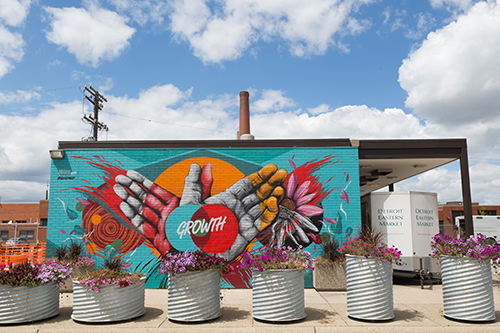
Following JPMorgan Chase’s groundbreaking success with Detroit’s investment in 2014, JPMC has continued its work in additional cities, including Chicago, with a $40 million, three-year philanthropic commitment. The firm just announced the expansion of the Chicago investment to $50 million in long-term, low-cost capital backing small business development on Chicago’s South and West Sides.
JPMorgan Chase CEO and Chairman Jamie Dimon has put forward a big vision for the future of AdvancingCities. “If it’s replicable, we want to do it everywhere,” he says. “We can’t do it overnight, but you’re going to see it expand.”
Chicago is very much a tale of two cities — one a celebration of a rich, diverse history of success intertwined with preeminent institutions like JPMorgan Chase, the other a tragedy of economic disparity, racial discord and violence — and AdvancingCities sends an important message.
As the only major US city to decrease in population three years in a row, Chicago needs the kind of collaboration that AdvancingCities fosters. JPMC has learned to use its convening power to collaborate for the good of Chicago and other struggling cities. Helping lift up struggling neighborhoods must also be good for business bottom line.
Lessons From Detroit
“Stable and thoughtful political leadership made a huge difference in Detroit,” explains Dan Sprehe, Managing Director of Corporate Responsibility for the Central Region of JPMorgan Chase, who has championed AdvancingCities from its inception. Supportive political leaders are essential to the bank’s selection of subsequent cities.
The bank’s investment in Detroit has clearly helped strengthen urban infrastructure and boosted the job market. JPMC served as a catalyst in the resurgence of Detroit, spurring a chain reaction for economic growth across its industries. Citywide impact ranged from the revitalization of residential and commercial properties to providing small businesses and entrepreneurs with technical assistance and capital from grants.
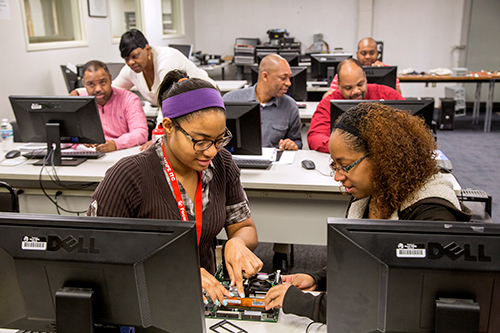
Key results include maintaining 700 jobs in Detroit, providing 15,000 individuals with job skills training for in-demand fields, opening 700 affordable housing units, boosting Detroit’s QLINE transit system (originally M-1 Rail), and building capacity for local nonprofit partners. Through close collaboration with community development financial institutions (CDFIs) Invest Detroit and Capital Impact Partners, the pace of progress exceeded initial expectations, two years ahead of schedule. The model’s rapid success has allowed the bank to accelerate its initial investment to $150 million this year.
Investing in Chicago
A significant reason Chicago was chosen next was because of the opportunity to build upon its current momentum and boisterous nonprofit network. When identifying cities to invest in, JPMC requires the following criteria to already be in place: a cohesive nonprofit network, a robust market, highly engaged workforce, and momentum already underway.
JPMorgan Chase’s 2017 Corporate Responsibility Report states: “Chicago’s civic, business, and nonprofit organizations have a proven track record of collaboration, which lies at the heart of our model’s success.” In fact, Chicago is 50 percent more philanthropic than any other U.S. city, as the Indiana University Lilly Family School of Philanthropy and Chicago Community Trust recently proved. Civic leaders know how to make private-public partnerships work. The bank built their Chicago plans on this solid foundation.
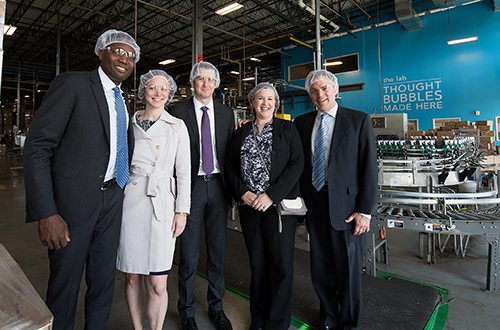
Completing its second year in Chicago, the Service Corps partnered with BSD (Building Self Determination) — a social enterprise of the Arthur M. Brazier Foundation (AMBF) — a manufacturing facility in Woodlawn that produces high-quality, sustainable plastic utensils. The JPMorgan Chase Foundation gave AMBF $500,000 for a two-year robotics technician training program with BSD. The goal is for this project to become fully self-sustaining by 2020. Profits from manufactured goods are to be invested back into the training program and community development opportunities through the foundation.
Service Corps member Tony Chopp is a prime example of JPMC talent improving on the firm’s philanthropy. Capitalizing on his unique skill set, Chopp discovered a more cost-effective alternative principal material and negotiated the price down substantially — saving BSD a whopping 67 percent.
South Side native Floyd Wilson experienced firsthand the life-changing path trajectory from JPMorgan Chase’s investment. What began simply as an announcement one day in church flourished into a clear path to a stable career and bright future. “After graduating high school, I really didn’t know what I wanted to do,” Wilson explains. Like many young adults, Wilson had tried several ventures but nothing stuck, that is, until BSD came into the picture.
Wilson is now a member of the first cohort to graduate from BSD’s workforce development program. Trained in autoCAD, industrial and electrical controls, and robotics programming, Wilson has accepted a job with automotive parts supplier Flex-N-Gate.
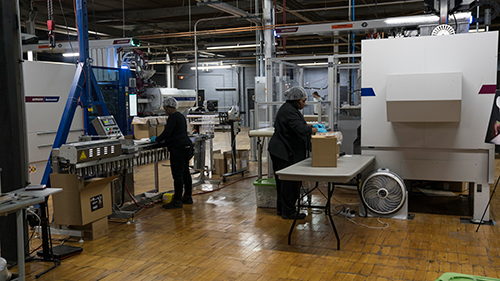
Chicago’s unemployment rate has dropped steadily since the start of 2018, but continues to float above the national average. JPMC’s workforce investment strategy aims to help fill the gap, capitalizing on the opportunity for talent in the middle-skill labor market and providing the proper training for these high-demand jobs.
Each person trained and placed in a job has the potential to have a powerful ripple effect for their families and communities alike.
Nothing Stops a Bullet Like a Job
Youth mentorship and development programs have made a tremendous impact in local communities.
The Fellowship Initiative (TFI) invites young men of color to apply for a three-year mentorship program with the firm before their sophomore year of high school. At this critical juncture in a young man’s life, TFI provides intensive academic and leadership training, resources for college and post-secondary opportunities, and personal and peer support. “It is incredible to see the change,” Sprehe says of the first Chicago cohort.
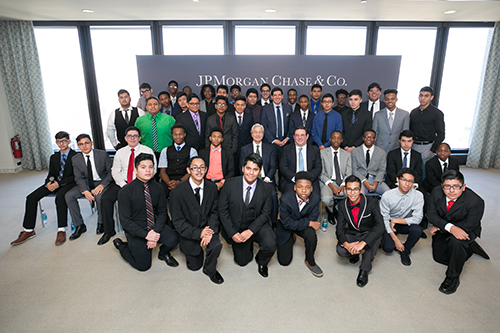
A TFI Fellow shares the potency of the program in a partner study from MENTOR, The National Mentoring Partnership: “My mentor came into my life and provided structure, did things with me that my parents couldn’t. He took me out to play ball, just sat and talked with me, and kept me from doing other things, like being in the streets.”
Growing Small Businesses
In conjunction with JPMorgan Chase’s Chicago investment, the bank has invested in two major initiatives supporting small business development on the South and West Sides. A $3 million investment was made to launch the Entrepreneurs of Color Fund with community partners Accion and Local Initiatives Support Corporation (LISC). The fund initially launched in Detroit to provide minority-owned small businesses with access to capital, mentorship, and training. Building upon its success, the model was expanded to New York’s South Bronx, San Francisco, and, of course, Chicago. An additional $1 million went toward Ascend 2020, business mentoring programs for minority entrepreneurs at the University of Chicago and Northwestern University.
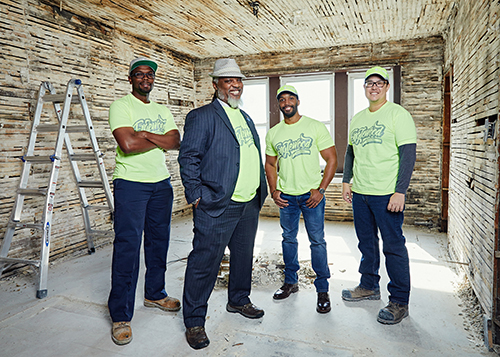
You Can Help Too
JPMC’s commitment to Chicago’s South and West Sides is a cohesive partnership between the city’s public, private, and nonprofit sectors. The bank’s trusted partners include Accion, Advocate Charitable Foundation, After School Matters, Arthur M. Brazier Foundation, Blue1647, Boys & Girls Clubs of Chicago, Cara, Center for Economic Progress, Center for Financial Services Innovation, Chicago Anchors for a Strong Economy, Chicago Cares, Chicagoland Chamber of Commerce Foundation, Heartland Alliance, IFF, Illinois Chamber of Commerce, Instituto del Progreso Latino, Lurie Children’s Foundation, Mercy Housing Lakefront, North Lawndale Employment Network, Women Employed, and more. Two of these partners, Accion and Mercy Housing Lakefront, are Make It Better Philanthropy Award winners. For a complete list of JPMC partners, visit their Investing in Opportunity: Chicago report.
The bank used its convening power to bring other businesses, like Fifth Third Bank, and governmental agencies into the collaborations too. It also welcomes and encourages support by anyone looking to help and create impact in Chicago.
The firm is constantly collecting insights from its initiatives and releases a quarterly update with current milestones. Sprehe suggests signing up to learn more about local impact and individual initiatives. He also urges others — not just JPMC employees, but anyone looking to get involved locally — to take a deep dive into the initiatives and local organizations and find what resonates on a personal level. Explore different skills-based volunteer opportunities that fit your talents and passions.
As Linda Hill, author and Wallace Brett Donham Professor of Business Administration at Harvard Business School, says in a conversation with Harvard Business Review, “[…] sustained innovation comes when everyone has an opportunity to demonstrate a ‘slice of genius’ […].” JPMorgan Chase’s genius is that it has created a platform that allows anyone to join in making a difference in their city through a wide-ranging collaboration with a proven model for impact.
